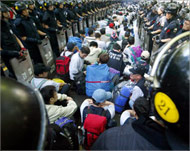South Korean strikes continue
Thousands of South Korean labour activists rallied in Seoul on Monday to support a walkout by railway workers as the country’s National Railway operation said it may fire striking employees and recruit new staff.
 |
|
Railway employees vowed to |
About 5,000 members of South Korea’s two umbrella labour groups held separate protests calling for higher wages and shorter working hours.
About 8,000 taxi drivers and lorry-drivers stayed off the roads in major cities. Public anger mounted in Seoul and nearby cities as roads became clogged with cars.
South Korea’s President, Roh Moo-Hyun, said labour unrest was one of the most urgent tasks facing his administration. He said railway workers, who continued their strike on Monday for the third day, would be dealt with according to the law, while one of his senior aides ruled out negotiations with the strikers.
Chief spokesman for the Korean National Railroad Administration, Seo Dong-Chul, said railway employees would be punished according to regulations.
Seoul had set 1300 GMT on Sunday as the deadline for strikers at the state-run Korean National Railroad (KNR) to return to work. But 85 percent of KNR’s 9,000 unionists defied the order and were off work on Monday, crippling 70 percent of passenger train services and 88 percent of cargo services nationwide.
Unions accused the government of breaching an earlier promise to consult workers over a plan to privatise state firms.
The strikes are the latest eruption of labour unrest in one of Asia’s fastest growing economies.
Officials from the Korean Railway Workers’ Union vowed to continue the strike, saying they wanted to engage in dialogue with Seoul. They accused the government of ignoring their calls for talks.
 |
|
South Korea’s Roh |
The government has so far refused to negotiate in the dispute with the 22,000-strong railway union, saying the strike was aimed at blocking a revision of a law to restructure the railway system rather than over labour issues.
Better business?
Over the weekend, riot police stormed a protest by striking railway workers and detained more than 1,000, marking the first sign of a tougher stance from authorities over recent unrest.
Signs of a growing confrontation between the government and labour hit financial markets, although analysts said a tougher government stance would be a positive factor in the long term.
“The new stance, which is more business-friendly, may be good news for investors in the long term but it is negative in the short term,” said analyst at Dongwon Securities, Chu Hee-Yeop.
In a separate protest, thousands of workers are expected to hold massive rallies later on Monday over pay and conditions.
The Federation of Korean Trade Unions, the country’s largest labour umbrella group, said more than 100,000 of its members would stop work for a day and thousands would stage a rally in central Seoul.